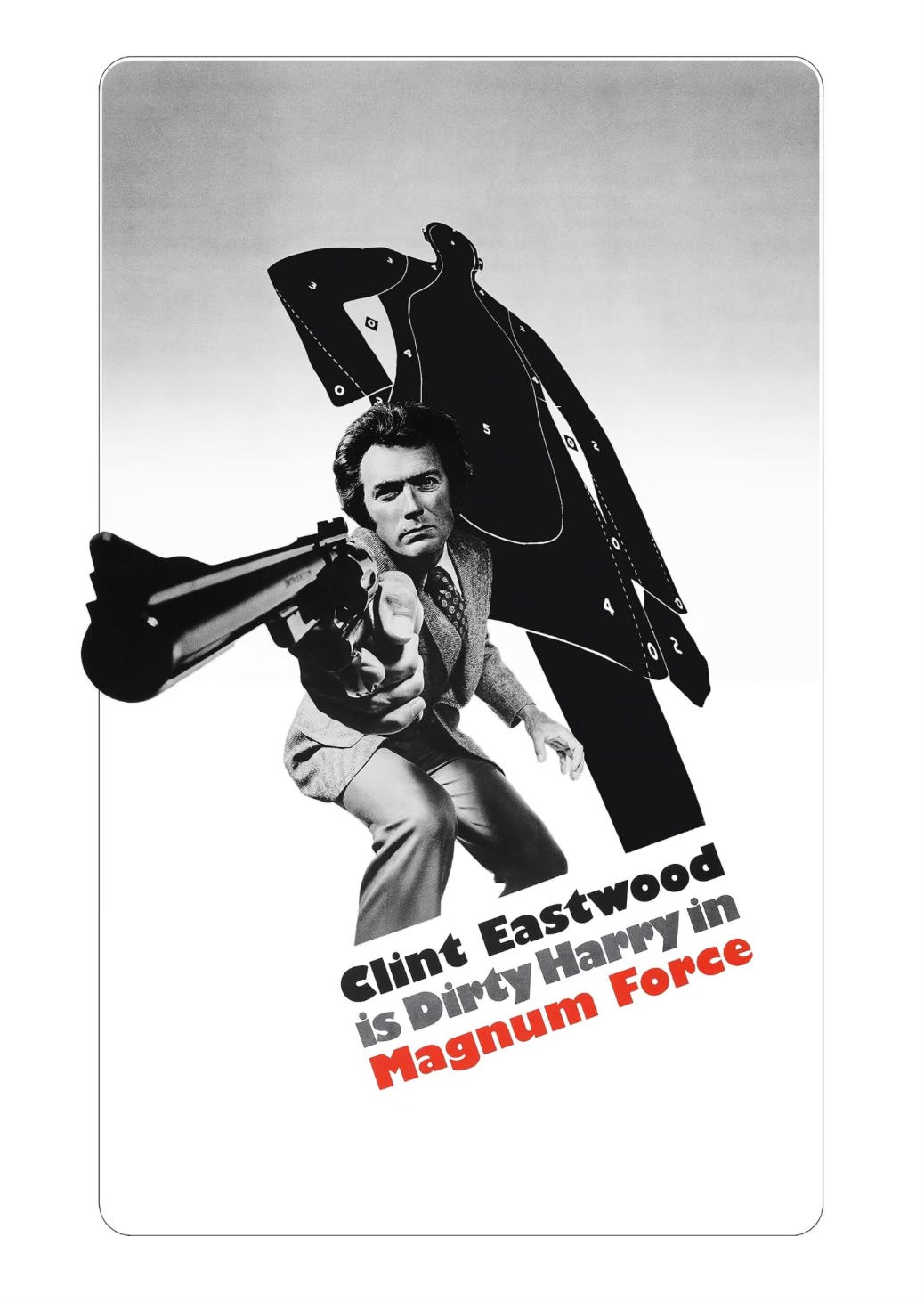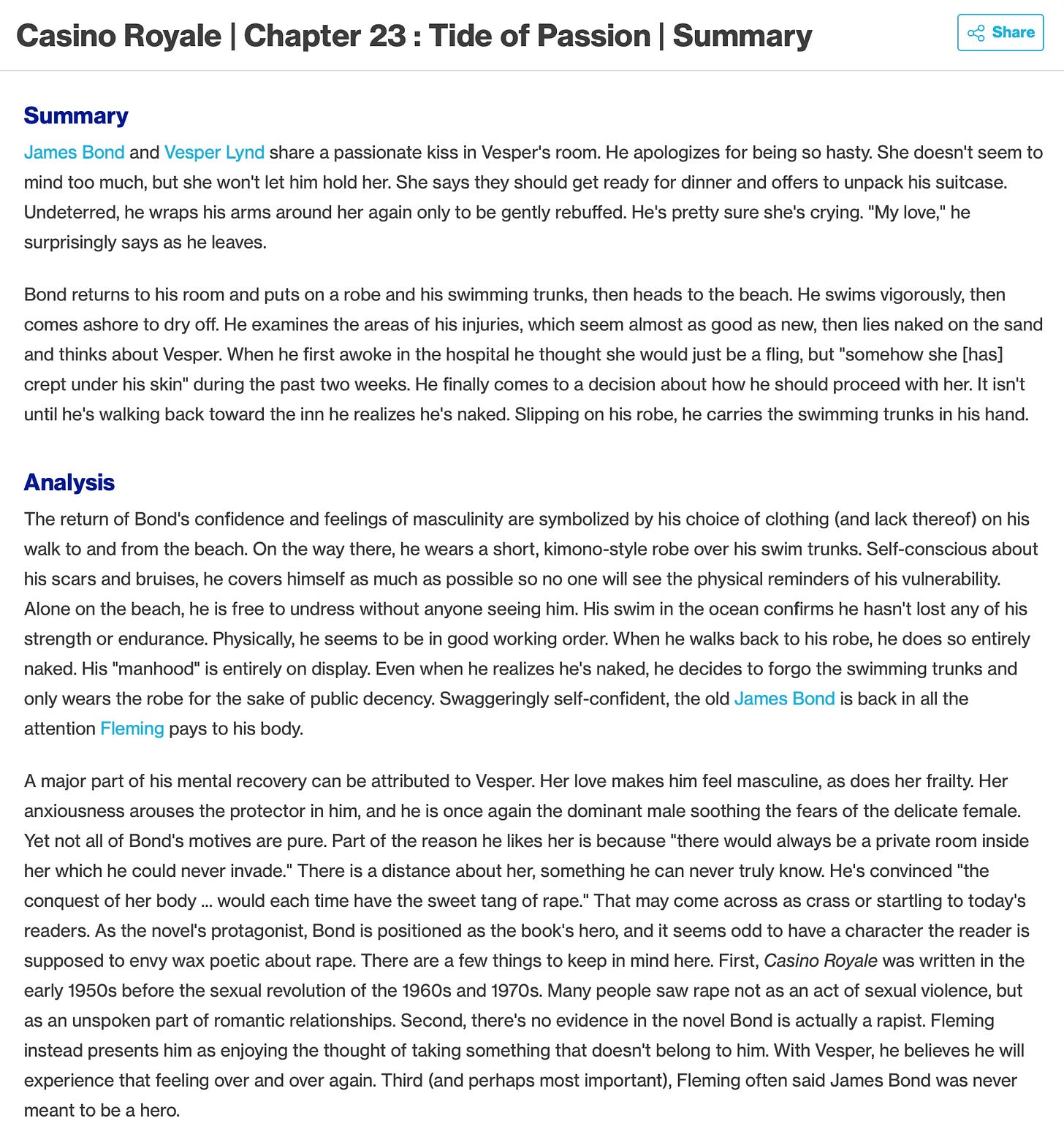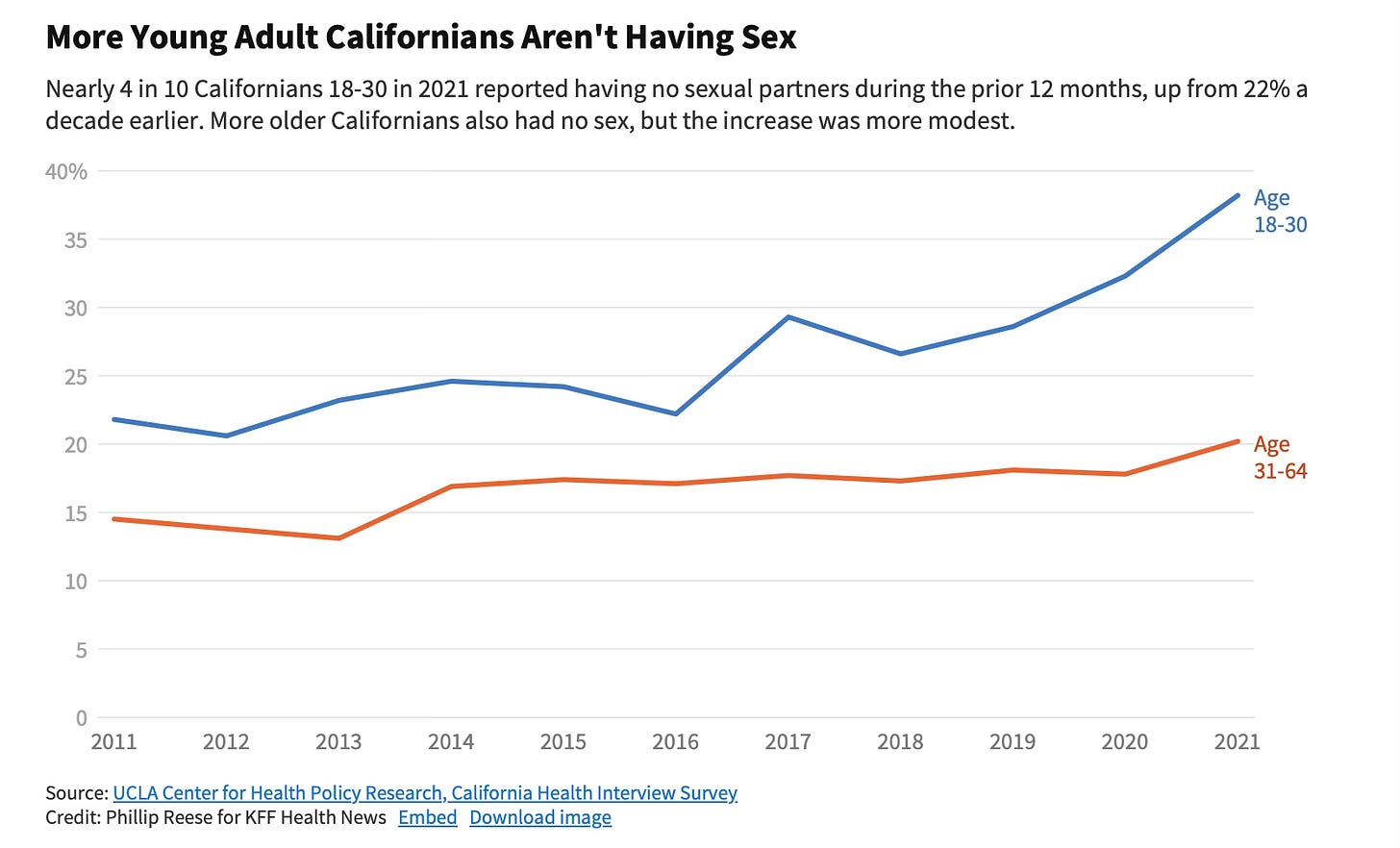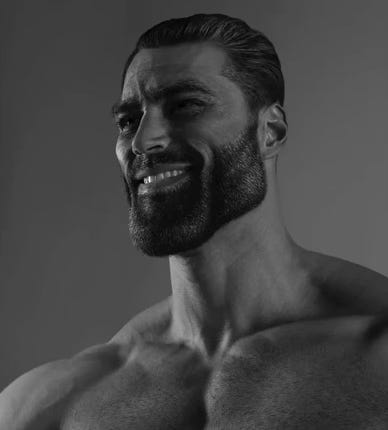Men's Adventure Fiction But Only My Youth Pastor Is Allowed To Be A Main Character
Pathologizing Masculinity
I was regrettably involved in an online debate recently, and I’m still not fully sure what the other side was actually arguing. How one can be in a debate and never have the issue at hand defined typically means one side was arguing purely from emotion and the “ick.” I’ll leave that there. But the debate did get me to thinking about the term “toxic masculinity” as well as its no less stupid brother term “healthy masculinity.” The debate revolved around this idea that James Bond was a bad character because he does bad things, and that a slightly off color line about rape in the book Casino Royale meant that James Bond was a capital R rapist, and that it was a travesty that men found James Bond, a psychopathic killer and perennial womanizer™, to be remotely aspirational. I’d like to add here that Bond’s morality has no real bearing on his quality as a (literary) character, and that his lack of morality might even be the point of the character.
The line in question and context is below:
With all that said, this essay isn’t really about Bond, but rather, what is downstream of this type of discourse. There is a lot of talk at any given moment about “taking back men’s fiction” or “making fiction that men and boys would want to read” that amounts to a whole lot of pablum. It is well intentioned, but nearly as harmful as the cultural trends its frantically trying to correct. And that is because 99% of the people involved have been almost permanently and irreparably mind-raped by the idea of “toxic masculinity.” We are all caught in the grips of this term in ways that we don’t even recognize. There is this idea that masculinity would be good if we could take all the little toxic bits out, when the truth is, all the toxic bits are what make masculinity capable of doing good in the first place. Taking the “toxic” out is a little bit like taking the alcohol out of beer. Sure, it tastes like beer, but its capacity to either relax you or fuck you up is completely gone.
According to Webster’s Dictionary, masculinity is the quality or nature of the male sex: the quality, state, or degree of being masculine. In other words, it is a biological reality modulated primarily by the sex hormone testosterone. It is not a philosophy, not aspirational, nor can it be toxic, nor can it be healthy. Masculinity is purely a grouping of biological traits. There really isn’t and shouldn’t be any ethical or moral value judgements assigned. To label some aspects of masculinity as healthy is just as obtuse as labeling some aspects toxic.
There is this idea that Masculinity™ is some sort of “build your own” sandwich, where one can go about picking and choosing traits, while adding and subtracting for severity. The biological reality is that High T levels lend themselves to doing two things really well—fighting and fucking. Those things kind of go together. It’s why the United States Marine Corps has a curfew in Japan.
James Bond, whether he is heroic, aspirational, or was even meant to be, exists at one end of the spectrum as an archetype of extreme masculinity. Also James Bond types abound in Special Forces, if we want to talk power fantasies, there are far better examples. James Bond is a power reality. Regardless, he is always horny, always ready for round two, has a license to kill, and is eager to use it. He puts himself in harms way because no one else is as competent or as willing to as him. Why men find him aspirational is readily apparent. This isn’t hard stuff.
He is not heroic in the traditional sense, because he is not doing any of this for the “right reasons” but purely for the love of the game. And that is ok. In fact, that is mostly how heroism comes packaged. And I actually think it is a precursor to all heroism. To try to cut this step out is nonsense and a misunderstanding of masculinity and the heroic.
Paul Zweig in his very well argued book The Adventurer: The Fate of Adventure in the Western World has this to say:
The lives of these equivocal heroes are articulated by a series of dramatic faults. Starcatherus, in the Gestum Danorum, is a dangerous betrayer. The Third Horace, after his exciting victory over the champions of Alba, kills his own sister in a fit of uncontrollable anger. Indra’s career involves a number of forfeits committed in the line of duty, but nonetheless reprehensible. Behind these widely different heroic figures, one glimpses the profile of an archaic Indo-European adventurer god, a profoundly ambivalent character whose gift for violence and extreme action creates a problem for those who need to make use of him. The unruly wanderer, which his mystical vitality has made of him, must be harnessed and tamed. He must be caught in the snare of civilization (Conchobar’s procession of naked women, the harlot seducing Enkidu in the epic of Gilgamesh) before he can be calmed into a hero. Even then the hero form will alter and slip; the archaic energies will reassert themselves.
These are also reasons that I have always found the reluctant hero to be a fairly noxious genre convention and mostly antithetical to Adventure Fiction™. The reluctant hero assumes the classically liberal framing that violence and masculinity is bad (hetero sex is also on a short leash). BUT, to be fair to this trope, a hero is feminized. As Paul Zweig argues above, the man of action must be caught in the snare of civilization and female magiks before he is pliable enough to be a traditional hero.
Modernity has sought to forget this transformation and just simply skip to the heroism. But there can be no heroism without there first being a berserker fury and strength. Now, the reluctant hero amounts to nothing more than a feminist approved version of a hero. All masculinity is toxic, therefore it follows that all heroes must be reluctant. The hero must be reluctant to use his masculine virtue, reluctant to use violence, reluctant to take forward moving action. He is to be bound behind a glass wall of feminine shame and guilt for ever having had masculine traits at all. At least until there is a big enough emergency, then the glass can be broken, and it should only be broken if the emergency threatens the liberal order. Gone are the stories about answering an ad that promises adventure and treasure and tells you to bring money for your own burial. That inciting incident won't do.
We can watch these gender politics play out in Hollywood in hilarious ways. Gone is the fan favorite plot of a heroic man saving or protecting a female love interest. This of course still remains a fan favorite, so you’ll see it snuck into media as a father figure saves daughter figure. It scratches most of the audience’s itch, but doesn’t step on any liberal sacred cows. Namely, that women can do everything a man can do, just twice as well.
But this essay, as the title alludes, isn’t really directed at the ladies. If some of them don’t find Bond particularly compelling, then I can’t say I’m particularly surprised. In fact, I find it very ironic that the debate itself is so indicative of the very metaphysics Zweig laid out above. Women are the TAMING and CIVILIZING force. It’s to be expected. But we can’t forget the ingredients of heroism. We must strive to promote and cultivate the terrifying and destructive energies first, if women and civilization are to have anything to tame into a hero.
And thus this essay is directed at the poor guys who find themselves brow-beaten by a world full of hormone disruptors and estrogenic foods. Men who've been beaten over the head with this idea of toxic masculinity for most of their lives. The natural reaction is to think that one could have it all back if only they could rehabilitate “masculinity.” Perhaps, if we could just make it “healthy” or demonstrate “healthy masculinity” then we can once again have safe streets and live in a place not ruled over by the tyranny of the masses and administered by eunuchs and women. And so we find ourselves with a glut of “Men’s fiction” that is constantly looking back timidly to see if the spector of schoolmarms past is going to rap them across the knuckles for writing something too violent or too horny or too off color. The truth is, you should be writing to piss everyone off so that the people that love you can find you. And if fiction is going to be advertised as Men’s this or that, then it should have tits, and off color remarks, and sexist jokes, and violence. It should have a vitality and virility that makes some people uncomfortable. Otherwise, just call it Adventure or Action or Crime. What exactly is being advertised by the word Men’s!
I am no better, either. We are all trapped in endocrine disruptor hell and we are all at various stages of trying to escape the humiliation ritual. All our heroes have done nothing but apologize for being heroes. All of them are reluctant. The Joker was outright raped because we dared like a version of him too much. None of them have ever been allowed to scare the hoes. And if they do, then they get updated for modern audiences (see the recent James Bond re-printings).

The mind trick that is “toxic masculinity,” is all in its framing. After all, why are you a sexist misogynistic and evil pig, anon? Why did you beat your wife this morning? There is no way to answer these questions without sounding guilty.
It is one small step between this premise, this idea of toxic masculinity, and the DSM-5. Masculinity itself has been pathologized. Again, according to Webster’s, to pathologize is to view or characterize as medically or psychologically abnormal. This plays out all around us in increments and iotas until we are so captured by a disordered world view that our very attempts to extricate ourselves dig us in a little deeper.
Psychotherapy in and of itself isn’t necessarily bad. I enjoy dipping my toes into some Carl Jung every once in a while. What is bad, is the psychologization of everything. We have all met these people. The ones trapped in a hall of mirrors called self help. They use therapy speak and march around with the sort of authority only the most victimized can muster. Everyone in their life is a narcissist or some flavor of sociopath, even though that is statistically impossible. Just last week, they learned what Machiavellianism is from some article in Buzzfeed or The Atlantic about the Dark Triad.
So let’s talk about the dark triad. The dark triad is narcissism, psychopathy, and machiavellianism. Now, my point in bringing this up is not to run apologia for psychopaths and Cluster B personality types. But it is to show you that these labels can be very dangerous political tools when placed in the hands of a society administered by women and low-T men. As such, let’s play a game and rebrand each of these as masculine traits. Narcissism could look like self confidence, honor, or pride. Psychopathy could look like a capacity to commit violence or even an ability to control one’s emotions. Machiavellianism can look like charisma and guile. Odysseus was known for his guile by the way. He was Odysseus the Cunning not Odysseus the upright citizen. In fact, guile might be one of the most overlooked characteristics of a good adventure hero, but that is probably another essay.
Obviously Odysseus belongs to this second category of heroes who are not heroes at all. They share all the qualities of the “moral” hero, but one: they are not loyal, nor are they disloyal. The question simply does not arise for them. Their loyalty is directed towards the turns and chances of their own destinies. We call such a hero an adventurer.
The Adventurer: The Fate of Adventure in the Western World by Paul Zweig
My point here, and the point in the video above, is that dark triad traits in disordered men attract naive women because they look very similar to highly desirable masculine traits (and in some evolutionary situations might even be highly desirable, see Total Neanderthal Death).
Where all of this becomes more than a bit dangerous, is when normal masculine traits get confused for Dark Triad Traits or outright labeled that way because moderns have gotten so soft. Fighting, disagreeability, competition, charisma, cunning, pride, honor culture, hazing—all of these natural and important masculine impulses get curbed and shamed because they scare both hoes and tyrants alike. This also explains why no one is having sex, because it turns out, despite what they say, the hoes like to be scared (see every romance novel ever written).
Young People Are Having Less Sex Than Their Parents Did at Their Age
What we are seeing is a mass infantilization and sterilization of the populace through safetyism and just outright hormonal hallucination. REN speaks on this. And let’s forget masculinity for a second, a whole essay could probably be written on the pathologization of being human. Lower testosterone, round off the corners, and make it gay, that is what is happening nearly everywhere. It’s leaking into our fiction and into our lives.
It’s a bit disheartening to see pearl clutching over hard-nosed characters in men’s adventure fiction. I hate to break it to you, but nobody is buying your youth pastor as an adventure hero. And nobody wants to. Let’s not confuse castration for virtue. The guy that manages temptation by keeping his libido as low as humanly possible through a mix of prayer, Bisphenol A, Doritos Locos Tacos, and a lack of exercise isn’t who we need to use to rebrand masculinity. Onan the Librarian is relevant here. In fact, I would make the argument that he almost by definition can’t be heroic because he doesn’t have the virility and inherent destructiveness necessary to become one.
A low libido and chronic depression doesn’t make you chaste just because you can’t get laid. You want to test yourself against the sins of the flesh, try walking around with T levels that would make a United States Marine blush while dime-pieces throw themselves at you. Then we can talk about your virtue and discipline.
Let’s take Samson in the Bible, it turns out that a man who was strong enough to kill lions with his bare hands and tear through a thousand Philistines with the jawbone of an ass, also had an achilles heel named Delilah. Or King David and his many wives and concubines. Ironically, I just realized that the Philistines primarily defeated Samson by using the feminine sex magiks on him. I’m not advocating for harems here, but I am trying to get across that character flows logically out of biology. High T males are confident, like to fight, and are very horny. None of this needs to be or should be apologized for or censored. It is reality.
This is important for fiction authors why? Because often I see a lot of well intentioned pablum getting tossed around the space and no real ideation about what is needed or even wanted. I’m writing this mostly to work out my own ideas, but also to give anyone listening some ideas as well. We need more executable ideas in the space. Less hyping each other up. More arguments! We have all allowed ourselves to get much too intellectually lazy.
I’m heartened by the renewed interest in Adventure Fiction that I have been seeing all over the place. I also think it’s telling that Adventure has been identified as this sort of lost category of literature and is at least intuitively linked to masculinity and men’s fiction. But I think it’s a mistake to try and conflate adventure and the heroic too closely. I believe the two stand in tension with each other. That tension can’t exist if we are always trying to castrate masculinity and present it as “healthy.” Adventure is almost by its very name, individualistic and self indulgent. Adventurers do it for the love of the game, for the love of danger, and the idea of proving themselves. Adventure is a man’s game.
For the love of all that is holy, let’s just own toxic masculinity. Fuck it, who cares.






I once searched online for help understanding my husband’s pov and now the algo keeps sending me articles on how to survive a narcissist. Haha he is the most normal mental health wise of anyone I’ve ever met. The labels are ridiculously overdone. Viva la difference!
Much as Bond is portrayed as a womanizer in the movies, the only woman he fornicates with in Casino Royale is Vesper--and it's premarital, not non-marital, because he silently plans to marry her. And of course it's shown to be a bad idea--Vesper is an unwilling double, because someone else she had a fling with is threatened with death to keep her in line.
He's also only killed two people, and has severe qualms about it to the point he considers quitting the service toward the end of the book.
So yeah, complaints about his moral failings in Casino Royale meaning he cannot be admired are for people who haven't read the source material.
All that said, you didn't make your thesis or conclusion clear either, so it's difficult to argue for or against it. If it's "don't worry about your masculinity being toxic" then, well, of course. It's an anticoncept anyway. The moral problem with Movie Bond is his excessive fornication without it being shown to be unwise, which is not a problem in the source material, and nothing to do with the absurd concept of toxic masculinity.